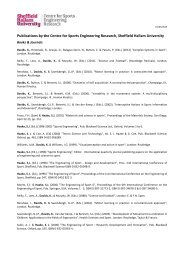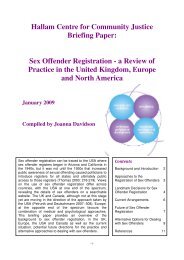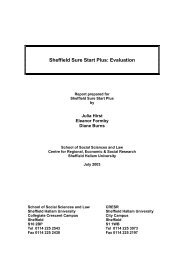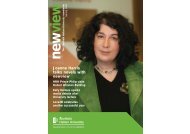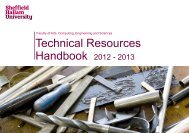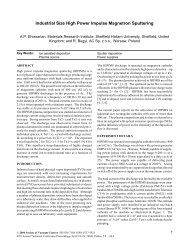The exercise of judicial discretion in rent arrears cases - Sheffield ...
The exercise of judicial discretion in rent arrears cases - Sheffield ...
The exercise of judicial discretion in rent arrears cases - Sheffield ...
You also want an ePaper? Increase the reach of your titles
YUMPU automatically turns print PDFs into web optimized ePapers that Google loves.
A few judges used benchmark figures to trigger particular types <strong>of</strong> order (see Chapter 7) but<br />
this was a relatively uncommon practice. Indeed not all judges considered the level <strong>of</strong><br />
<strong>arrears</strong> to be a key factor <strong>in</strong> determ<strong>in</strong><strong>in</strong>g the outcome <strong>of</strong> <strong>cases</strong>. As an alternative some<br />
judges stated they scrut<strong>in</strong>ised the payment history as a way <strong>of</strong> deduc<strong>in</strong>g <strong>in</strong>formation about<br />
the tenants’ motivation and attitude to the <strong>arrears</strong>. <strong>The</strong> payment record could be used both<br />
as an <strong>in</strong>dicator <strong>of</strong> the tenants’ ability to keep to the terms <strong>of</strong> an order and as a measure <strong>of</strong><br />
reasonableness i.e. the capacity <strong>of</strong> the tenant to pay the <strong>rent</strong> and their <strong>arrears</strong> with<strong>in</strong> a<br />
reasonable time. In describ<strong>in</strong>g why the payment history was important many judges drew on<br />
polarised stereotypes to expla<strong>in</strong> what they were look<strong>in</strong>g for. For example, a number <strong>of</strong><br />
judges expla<strong>in</strong>ed their approach <strong>in</strong> terms <strong>of</strong> dist<strong>in</strong>guish<strong>in</strong>g between tenants who “can’t pay”<br />
because <strong>of</strong> unemployment, ill health, or some other vulnerability and those that “won’t pay”<br />
(reflect<strong>in</strong>g evidence suggest<strong>in</strong>g this difference – see p. 12):<br />
“<strong>The</strong>re is <strong>of</strong> course the hard core who simply will not pay no matter what, they don’t<br />
see why they should. […] I’m much more likely to be tough on them because, you<br />
know, there’s a difference between ‘can’t pay’ and ‘won’t pay’”. (DJ O)<br />
“It’s fair to say that a lot <strong>of</strong> these people, they will fall <strong>in</strong>to two categories: Either<br />
they’re just feckless and irresponsible, they choose not to pay the <strong>rent</strong> and they’ve<br />
got it com<strong>in</strong>g to them or they can’t…they have problems you know, <strong>of</strong>ten around<br />
drugs or alcohol, unemployment or illness.” (DJ J)<br />
Others focused on whether the tenant was a habitual defaulter or if they were generally<br />
reliable:<br />
“What I’m look<strong>in</strong>g for usually <strong>in</strong> a way is to see the pattern <strong>of</strong> what the tenant’s do<strong>in</strong>g.<br />
I mean are they a habitual defaulter who will make a bit <strong>of</strong> an effort when it comes to<br />
court, but fall back aga<strong>in</strong> automatically and all the rest <strong>of</strong> it or whether they’re<br />
somebody who’s got onto a particularly sticky period and is gett<strong>in</strong>g deeper <strong>in</strong>to a<br />
mess at the moment. Or whether they’re somebody who’s generally been very<br />
reliable but just obviously struck some problem…” (DJ F)<br />
Judges were concerned to establish if the tenant was trustworthy. In assess<strong>in</strong>g the extent to<br />
which tenants could be trusted, judges were look<strong>in</strong>g for evidence <strong>of</strong> what efforts had been<br />
made prior to the court hear<strong>in</strong>g. In this context <strong>in</strong>formation about how tenants had<br />
conducted themselves dur<strong>in</strong>g the tenancy and the action they had taken to deal with the<br />
<strong>arrears</strong> prior to the court hear<strong>in</strong>g were thought to be important factors <strong>in</strong> determ<strong>in</strong><strong>in</strong>g<br />
outcomes. As one judge po<strong>in</strong>ted out, if the tenant had done noth<strong>in</strong>g to help themselves, why<br />
should the court?<br />
“One <strong>of</strong> my guid<strong>in</strong>g pr<strong>in</strong>ciples, is I look to see to what extent the tenant has helped<br />
him or herself or is able to help him or herself and, if they are able to help<br />
themselves. If they do absolutely noth<strong>in</strong>g to help themselves then I don’t see why<br />
the court should help them frankly.” (DJ U)<br />
61



